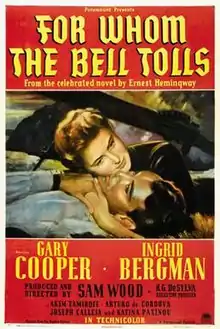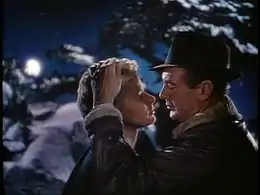| For Whom the Bell Tolls | |
|---|---|
 Theatrical release poster | |
| Directed by | Sam Wood |
| Screenplay by | Dudley Nichols |
| Based on | For Whom the Bell Tolls by Ernest Hemingway |
| Produced by | Sam Wood |
| Starring | |
| Cinematography | Ray Rennahan |
| Edited by | |
| Music by | Victor Young |
| Color process | Technicolor |
Production company | |
| Distributed by | Paramount Pictures |
Release date |
|
Running time | 170 minutes (19 reels) |
| Country | United States |
| Language | English |
| Box office | $17.8 million (worldwide)[1][2] |
For Whom the Bell Tolls is a 1943 American epic war film produced and directed by Sam Wood and starring Gary Cooper, Ingrid Bergman, Akim Tamiroff, Katina Paxinou and Joseph Calleia. The screenwriter Dudley Nichols based his script on the 1940 novel For Whom the Bell Tolls by American novelist Ernest Hemingway. The film is about an American International Brigades volunteer, Robert Jordan (Cooper), who is fighting in the Spanish Civil War against the fascists. During his desperate mission to blow up a strategically important bridge to protect Republican forces, Jordan falls in love with a young woman guerrilla fighter (Bergman).
For Whom the Bell Tolls was Ingrid Bergman's first Technicolor film. Hemingway's desire for Cooper and Bergman for the leading roles was much publicized, but Paramount initially cast Vera Zorina with Cooper. After shooting footage with Zorina's hair cut short (truer to the novel's character — a shorn head — than Bergman's "look" in the film), she was replaced with Bergman.[3]
For Whom the Bell Tolls was nominated for nine Academy Awards, including Best Picture. The film claimed one win as Katina Paxinou won Best Supporting Actress. Victor Young's soundtrack for the film was the first complete score from an American film to be issued on record.[4]
Plot
During the Spanish Civil War, an American language teacher, Robert Jordan, who lived in Spain during the pre-war period, fights in the International Brigades against Francisco Franco's forces. An experienced dynamiter, Jordan is ordered to travel behind enemy lines and destroy a critical bridge with the aid of a band of local anti-fascist guerrillas. The bridge must be blown up to prevent enemy troops from traveling across it to respond to an upcoming offensive against the fascists.

Jordan meets an old man, Anselmo, who is a guerrilla fighter who will serve as Jordan's liaison with the local guerrilla fighters. Anselmo leads Jordan to a group of Republican guerrillas who are led by a middle-aged man named Pablo. Jordan falls in love with one of the guerrillas, a young woman named María. María's life was shattered by her parents' execution and her gang-rape at the hands of the Falangists (part of the fascist coalition) at the outbreak of the war. Jordan has a strong sense of duty, which clashes with the unwillingness of the guerrilla leader Pablo to commit to helping with the bridge-blowing operation, as it would endanger himself and his band. At the same time, Jordan develops a new-found lust for life which arises from his love for María. Pablo's wife Pilar displaces Pablo as the group leader and pledges the allegiance of the guerrillas to Jordan's mission. However, when another band of anti-fascist guerrillas, led by El Sordo, is surrounded and killed in a desperate last stand, Pablo destroys Jordan's dynamite detonation equipment, hoping to prevent the bridge demolition and thereby avoid fascist reprisals on his camp. Later, Pablo regrets abandoning his comrades and returns to assist in the operation.

However, the enemy, apprised of the coming offensive, has prepared to ambush the Republicans in force and it seems unlikely that blowing up the bridge will do much to prevent a rout. Regardless, Jordan understands that he must still demolish the bridge in an attempt to prevent fascist reinforcements from overwhelming his allies. Lacking the equipment destroyed by Pablo, Jordan and Anselmo improvise an alternative method to explode the dynamite by using hand grenades. Jordan attaches wires to the grenades so that their pins can be pulled from a distance. This improvised plan is considerably more dangerous than using conventional detonators, because the men must increase their proximity to the explosion.
While the guerrilla fighters—Pablo, Pilar, and María—create a diversion for Jordan and Anselmo, the two men plant and detonate the dynamite, costing Anselmo his life when he is hit by a piece of debris from the exploding bridge. While the guerrillas are escaping on horseback, Jordan is maimed when a fascist tank shoots his horse out from under him. Jordan cannot feel his legs and he knows that if his comrades stop to rescue him, they too will be captured or killed. He bids goodbye to María and ensures that she escapes to safety with the surviving guerrillas. Armed with a Lewis machine gun, he waits until the horse-mounted fascist soldiers appear in his gun sights. He then pulls the trigger, firing a sweeping barrage at the oncoming soldiers. The film ends with Jordan firing the Lewis gun directly at the camera.
Cast

- Gary Cooper as Robert Jordan
- Ingrid Bergman as María
- Akim Tamiroff as Pablo
- Arturo de Córdova as Agustín
- Vladimir Sokoloff as Anselmo, the guide
- Mikhail Rasumny as Rafael, the gypsy
- Fortunio Bonanova as Fernando
- Eric Feldary as Andrés, the courier
- Victor Varconi as Primitivo, the lookout
- Joseph Calleia as El Sordo
- Lilo Yarson as Joaquin
- Katina Paxinou as Pilar
- Alexander Granach as Paco
- Adia Kuznetzoff as Gustavo
- Leonid Snegoff as Ignacio
- Leo Bulgakov as General Golz
- Duncan Renaldo as Lieutenant Berrendo
- Frank Puglia as Captain Gomez
- Pedro de Cordoba as Colonel Miranda
- Michael Visaroff as Staff Officer
- Martin Garralaga as Captain Mora
- Jean Del Val as The Sniper
- John Mylong as Colonel Duval
Restoration
The film was originally released in a roadshow format, at 170 minutes (not counting intermission). For re-release, it was trimmed to 134 minutes, and it was not seen at its full length until the late 1990s, when it was archivally restored to 168 minutes. This restored version is the one that has been released on DVD. The restoration was photochemical, not digital, and the titles and some of the scenes in the early reels are slightly to significantly out-of-register.
Production
Paramount Pictures initially cast actress Vera Zorina opposite Cooper before replacing her with Bergman. The day's papers described the recasting: "They [Paramount] compromised on Zorina's hair, cutting it to two inches; the rest of the makeup was true to the book. The results were shown to Paramount executives. They gasped. 'No glamour,' they explained. 'She looks like a dishrag.' Sam Wood, producer-director, sighed. 'The part doesn't call for glamour,' he tried to explain. 'Well, she ought to have glamour without looking like it.' They tried it. They put caps on Zorina's teeth, touched up her facial makeup with a bit of mascara here and there, tailored the baggy pants to a slim hip, and gave the shirt an uplift. She looked more like the lovely Zorina but not at all like the hapless 'Maria.' They gave up. Miss Bergman was tested for the part. The tests were made with her hair long and the executives beamed. She looked glamorous. Tomorrow they will cut her hair short. They will dress her in baggy pants and a formless shirt. After that, no one knows."[5]
Reception
For Whom the Bell Tolls was the second-highest-grossing film of 1943, earning $6.3 million in distributor rentals in the United States and Canada.[6] A re-issue in 1957 earned an additional $800,000.[7] When adjusted for inflation and the size of the population when released, it ranks among the top 100 popular movies of all time at the domestic box office.[8]
For Whom the Bell Tolls holds a 67% rating on Rotten Tomatoes based on fifteen reviews.[9]
Accolades
16th Academy Awards

- Best Actress in a Supporting Role: Katina Paxinou
- Nominations
- Outstanding Motion Picture: Paramount
- Best Actor: Gary Cooper
- Best Actress: Ingrid Bergman
- Best Actor in a Supporting Role: Akim Tamiroff
- Best Cinematography (Color): Ray Rennahan
- Best Art Direction (Color): Art Direction: Hans Dreier, Haldane Douglas; Interior Decoration: Bertram Granger
- Best Film Editing: Sherman Todd, John F. Link Sr.
- Best Music (Music Score of a Dramatic or Comedy Picture): Victor Young
1st Golden Globe Awards
Wins
Others
The film is recognized by the American Film Institute in these lists:
- 2002: AFI's 100 Years...100 Passions – Nominated[12]
- 2005: AFI's 100 Years...100 Movie Quotes:
- Maria: "I do not know how to kiss, or I would kiss you. Where do the noses go?" – Nominated[13]
- 2005: AFI's 100 Years of Film Scores – Nominated[14]
Other versions
There was a one-hour Lux Radio Theatre version broadcast on February 12, 1945, which retained the principal cast from the film: Gary Cooper, Ingrid Bergman, and Akim Tamiroff.[15]
See also
References
- ↑ "All-Time Top Grosses". Variety. Vol. 221, no. 6. January 4, 1961. p. 49. ISSN 0042-2738. Retrieved 2022-06-26 – via Archive.org.
- ↑ Cohn, Lawrence (October 15, 1990). "All Time Film Rental Champs". Variety. p. M-158. ISSN 0042-2738.
- ↑ "Ingrid Bergman Replaces Zorina." The Philadelphia Inquirer, 5 August 1942.
- ↑ Patrick Robinson. 1980. Movie Facts and Feats: A Guinness Record Book.
- ↑ "Zorina Loses Role of 'Maria' When Makeup Loses Glamour." Buffalo Evening News, 5 August 1942. (A widely-syndicated United Press article)
- ↑ "All-Time Top Grossers". Variety. September 25, 1946. p. 5.
- ↑ "'For Whom the Bell Tolls' (1943) Estimated Repeat Take, $800,000". Variety. January 1, 1958. p. 5. Retrieved February 22, 2019.
- ↑ "Top 100 Movies 1927-2021 by Box Office Popularity". Best Movies Of.
- ↑ https://www.rottentomatoes.com/m/for_whom_the_bell_tolls
- ↑ "The 16th Academy Awards (1943) Nominees and Winners". Academy of Motion Picture Arts and Sciences. Retrieved 2014-02-27.
- ↑ "NY Times: For Whom the Bell Tolls". Movies & TV Dept. The New York Times. 2012. Archived from the original on 2012-10-17. Retrieved 2008-12-16.
- ↑ "AFI's 100 Years...100 Passions Nominees" (PDF). Retrieved 2016-08-19.
- ↑ "AFI's 100 Years...100 Movie Quotes Nominees" (PDF). Retrieved 2016-08-19.
- ↑ "AFI's 100 Years of Film Scores Nominees" (PDF). Archived from the original (PDF) on 2013-11-06. Retrieved 2016-08-19.
- ↑ "Monday Selections". Toledo Blade (Ohio). 1945-02-12. p. 4 (Peach Section). Retrieved 2021-07-16.
Further reading
- Tibbetts, John C., and James M. Welsh, eds. The Encyclopedia of Novels Into Film (2nd ed. 2005) pp 133–135.
External links
- For Whom the Bell Tolls at IMDb
- For Whom the Bell Tolls at AllMovie
- For Whom the Bell Tolls at the TCM Movie Database
- For Whom the Bell Tolls at the American Film Institute Catalog
- For Whom the Bell Tolls at Rotten Tomatoes
- For Whom the Bell Tolls at Box Office Mojo
Streaming audio
- Radio adaptation of For Whom The Bell Tolls February 12, 1945 on Lux Radio Theatre; 50 minutes, with the original stars (MP3)